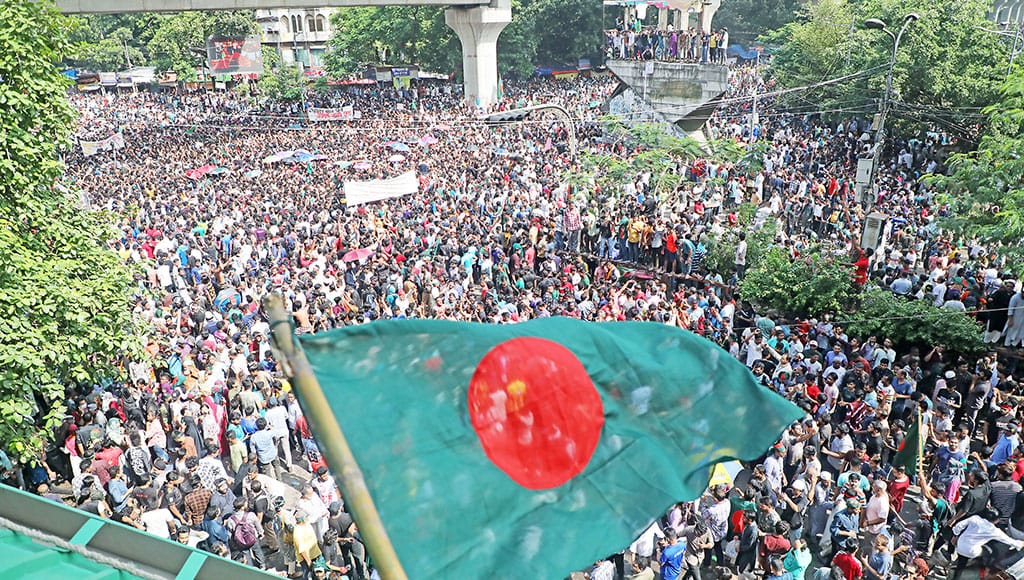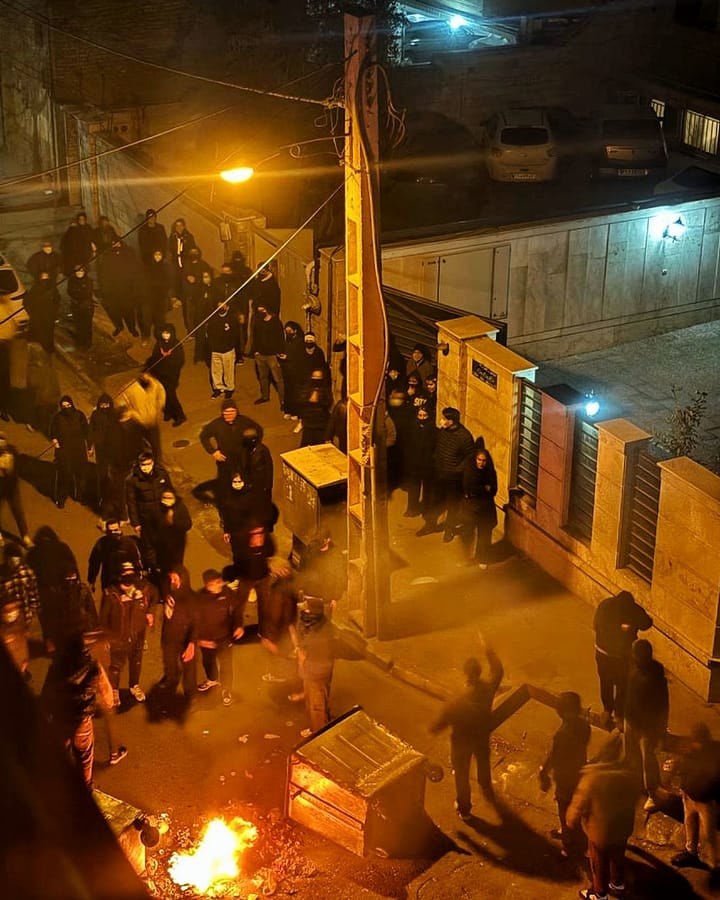In August 2024, Bangladesh’s streets erupted with a force beyond the control of any political party. Students, workers, and ordinary citizens dismantled Sheikh Hasina’s fifteen-year rule, built on electoral fraud, repression, and a web of loyalists embedded in the state. Lives were lost, families disappeared, and the scale of state violence, documented in BBC reporting and UN findings, points to abuses that verge on crimes against humanity. Mass surveillance, arbitrary detentions, and targeted oppression were not anomalies; they were a system.
A year later, on August 5, 2025, the interim government, led by Nobel laureate Muhammad Yunus, unveiled the July Declaration, a political manifesto framed as the blueprint for democratic reform. The document acknowledges the struggle of the people, denounces Sheikh Hasina’s autocratic rule, and calls for justice, accountability, and institutional reconstruction. The declaration emphasises the need for constitutional and state recognition of the 2024 uprising, aiming to include it in the schedule of the reformed constitution by the next elected government. It also calls for the recognition of the martyrs of the July uprising as national heroes and ensures legal protection for the students and citizens who participated in the movement.
Justice as the First Obligation
Accountability is non-negotiable. The lesson of the Magna Carta still holds: no one stands above the law. Born of a quarrel between a king and his barons, it was never meant as a democratic covenant, yet history has transformed it into a lasting symbol of restraint on power. If even a feudal monarchy could concede that rulers are not above the law, surely a republic must. Those who ordered killings, authorised torture, or dismantled the integrity of the ballot must one day account for what they did. The 1,400 lives taken in the uprising cannot be written off as the cost of history; they demand truth, justice, and remembrance. Yet redress without reconciliation breeds vendetta, while reconciliation without accountability invites impunity. Other nations have wrestled with this balance. South Africa’s Truth and Reconciliation Commission opened a space for testimony, acknowledgement, and the possibility, though never the guarantee, of forgiveness. Rwanda’s Gacaca courts, born of necessity after genocide, turned to the community itself for justice, pairing accountability with reintegration. Each, in its own way, tried to face atrocity honestly while preventing grievance from becoming the seedbed of another war.
The Role of the Transitional Government
Here the role of the transitional government is decisive. It must avoid the seductive rhetoric of national rebirth that narrows the definition of who belongs in Bangladesh. Democracy is not a prize for the triumphant but a civic contract that binds the whole nation. Jürgen Habermas, a prominent social theorist, reminds us that its legitimacy rests on the willingness to engage adversaries, even those who once upheld an undemocratic regime. If the interim leadership defines belonging in terms of allegiance rather than citizenship, it risks repeating the very authoritarianism it claims to dismantle.
Renowned historian and political scientist Benedict Anderson’s insight is also worth recalling: nations are “imagined communities,” sustained not by loyalty to a faction but by a shared community identity. A Bangladesh that defines belonging through political allegiance will turn dissenters into outsiders in their own country. The transitional ruling body must instead anchor its legitimacy in civic nationalism, rooted in rights, justice, and equality.
The Weight of Seventeen Million
The electoral arithmetic underscores the challenge. Recent polling indicates that 13.96 per cent of Bangladesh’s 123.7 million registered voters (roughly 17 million people) still support the Awami League, the party of the deposed Prime Minister Sheikh Hasina. Yet while the party is now associated with years of autocratic governance, it also led the fight for independence in 1971. Seventeen million citizens are not a negligible minority, and they cannot simply be erased from the political community of Bangladesh.
Accountability has to come first, for the 1,400 lives taken and for the countless others who bear wounds etched into memory. But once accountability has been secured, inclusion should follow. Democracy will not be sustainable through purges; it can only endure when institutions give space for adversaries to contend within rules accepted by all.
If justice can be joined with reconciliation, if every citizen is granted a place within the democratic covenant, Bangladesh may yet step beyond its half-century cycle of vengeance. In such a moment, the July Declaration would not be remembered as a passing cry of revolt but as the quiet turning of a page, the first signs of a political culture where democracy is not imposed from above but nurtured as a shared inheritance.
The Sacredness of Life
In a recent lecture, Dr Syed Nizar, Associate Professor in the Department of Philosophy at Jahangirnagar University, reminded us of a truth that Bangladesh has too often betrayed: the sanctity of life. Since independence, successive governments have treated people as if their existence could be discarded at will, through state killings, enforced disappearances, and arbitrary detention. No democracy can live when the state claims the power to slaughter its own populace. The right to live is not a ruler’s gift; it is the first foundation on which any society must rest.
To honour this truth means more than words. When a mother loses her son to an enforced disappearance, or when a family waits endlessly for a father taken without charge, the wound is not theirs alone but the nation’s. Dr Nizar further contends that justice postponed in such cases is not merely denied; it becomes complicity. He adds that the security forces must be reminded of their true duty. Their task is not the protection of regimes but the protection of citizens, their lives, and their property. That duty must be bonded in law and enforced by oversight strong enough to endure beyond the lifespan of any government. Finally, he insists that the arsenal of repressive statutes that permit abuse, such as The Cyber Security Act of 2023 and The Special Powers Act of 1974, must be dismantled or rewritten beyond recognition. It should be made very clear that the right to life is paramount. In fact, since the right to life has become so easily disregarded, even the death penalty should be abolished. Instead, life imprisonment can be used if needed, but the most important principle is to uphold the sanctity of human life above all.
Bangladesh’s Test of Will
The world will not measure Bangladesh’s future by the slogans of its uprising, but by the discipline of its democracy. It will not be judged on how fiercely it punished its enemies, but on whether it had the courage to turn those enemies into citizens again. The uprisings of 2024 proved that the people could dismantle a dictatorship. What comes next will prove whether they can build something stronger in its place: a republic that listens even when it disagrees, that protects even those it does not love.
This is Bangladesh’s test of will. If the transitional government can build institutions where justice is not delayed, if it can open the circle of belonging so that no citizen is cast aside, and if it can protect the sanctity of life so that parents are not left waiting for children who never return, then the July Declaration will be remembered not as an act of retribution but as the first chapter of renewal. If it falters, liberation itself will curdle into exclusion, and democracy risks becoming a fleeting mirage: visible for a moment but dissolving when most needed.
18.08.2025
Dundee
Dr. Abdullah Yusuf is a Senior Lecturer (Associate Professor) in Politics and International Relations at the University of Dundee, UK. He studied Public Policy and Diplomacy at The Australian National University in Canberra, Australia, and holds a PhD in International Relations from the University of Dundee. His research and scholarship interests include: International organizations (United Nations, League of Arab States, and African Union); Politics of the Middle East, including Palestine, Israel, and the Arab-Israeli conflict; Politics of humanitarian armed interventions; Peacekeeping and post-conflict peacebuilding; International law and refugee protection; Climate politics; Post-colonial Studies. For more details on my teaching, research, and scholarship profile, please visit: his research profile and bio.



